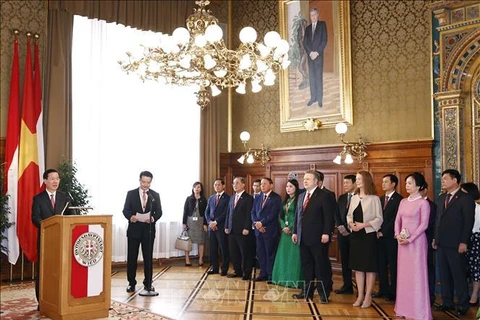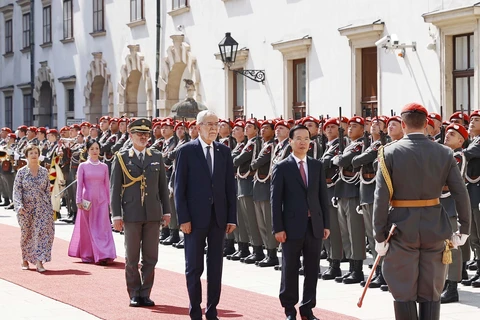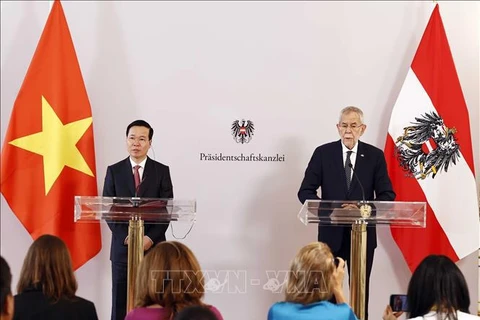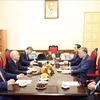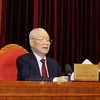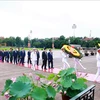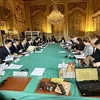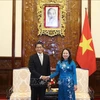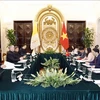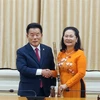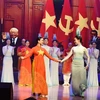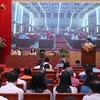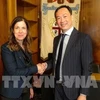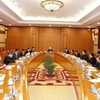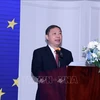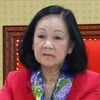Hanoi (VNA) – President Vo Van Thuong’s official visit to Austria at the invitation of his Austrian counterpart Alexander Van der Bellen is expected to further deepen the sound traditional friendship and cooperation between Vietnam and the European country.
Austria was one of the first Western countries to set up diplomatic relations with Vietnam on December 1, 1972, even before the war ended in the Southeast Asian country.
The bilateral ties have continuously expanded through the regular exchange of all-level delegations, including high-level visits.
Particularly, after the official visit of then Prime Minister Nguyen Xuan Phuc to Austria in October 2018, the bilateral relations have grown strongly with the signing of a series of cooperation deals between agencies and businesses of the two countries.
During this visit, the Vietnamese Ministry of Industry and Trade and the Austrian Ministry of Digital and Economic Affairs signed a memorandum of understanding on cooperation in digital technology and e-commerce, laying an important foundation for the two sides to conduct collaboration activities in the fields in the time to come.
Along with the bilateral cooperation, the two nations have coordinated with and supported each other at multilateral organisations and forums, especially at the United Nations (UN), the Asia-Europe Meeting (ASEM) and within the ASEAN-EU strategic partnership.
 National Assembly Chairman Vuong Dinh Hue addresses the Vietnam-Austria Business Forum in September 2021
National Assembly Chairman Vuong Dinh Hue addresses the Vietnam-Austria Business Forum in September 2021 (Photo: VNA)
Vietnam and Austria have shared common viewpoints on the East Sea issue and the settlement of disputes through peaceful measures on the foundation of international law and the UN Charter, as well as the respect for the 1982 UN Convention on the Law of the Sea (UNCLOS).
Economic and trade cooperation has been one of the priorities in the bilateral relations. The EU-Vietnam Free Trade Agreement (EVFTA), which took effect in August 2020, has brought about positive results in trade ties between Vietnam and Austria, with increasing import-export revenue.
Currently, Austria is one of the largest trading partner of Vietnam in Europe, with two-way trade reaching 3.2 billion USD in 2020, 13 times higher than that in 2010. The figure hit over 3.3 billion USD in 2021 and 2.79 billion USD in 2022.
Vietnam mostly exports telephones and components, footwear, wood and wood products, and garments and textiles to Austria, while importing medicines, machines, equipment, steel products, paper, animal feed and materials from the European country.
Vietnam is a potential market for Austrian firms, and a gateway for Austrian products and services to reach the 670-million-strong ASEAN market.
In terms of investment, as of November 20, 2022, Austrian enterprises had run 43 valid projects in Vietnam with a total investment of 148.59 million USD, ranking 44th out of 141 countries and territories investing in Vietnam. Currently, Austria is finalising procedures to ratify the EU-Vietnam Investment Protection Agreement (EVIPA).
In terms of vocational training and labour cooperation, Vietnam and Austria have shown their special interest in collaboration in IT engineer and nurse training and employment, as Austria has had high demands in the areas.
In the field of cultural cooperation, Vietnam and Austria have enjoyed a growing partnership as Austria has sent experts and lecturers to teach at the Hanoi University of Theater and Cinema and the Vietnam National Academy of Music.
Austria has provided Vietnam with about 20 scholarships to Vietnamese post-graduates each year. The Austrian Embassy in Vietnam has supplied German teaching materials and equipment to universities in Hanoi.
Currently, more than 5,000 Vietnamese people are living and working in Austria.
According to Austrian Federal Minister for European and International Affairs Alexander Schallenberg, the Vietnamese community is one of the most valued foreign communities in Austria thanks to their hardworking and great contributions to the host country’s socio-economic development./.

